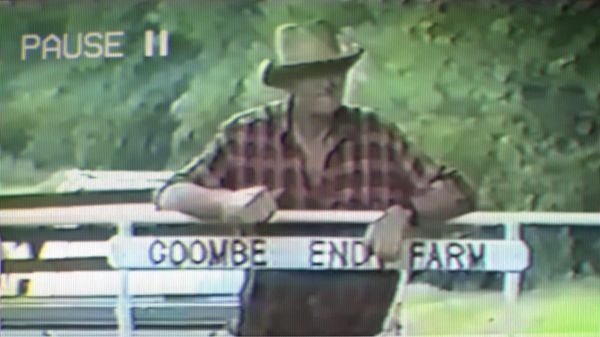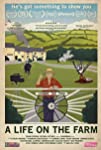Eye For Film >> Movies >> A Life On The Farm (2022) Film Review
A Life On The Farm
Reviewed by: Jennie Kermode

Ask the average person about film and they’ll probably only care about what’s in the local multiplex or what they’ve recently streamed on Netflix. If you’re a regular reader of Eye For Film, you’ll know that there’s a lot more out there – but parallel to the independent cinema we generally cover there’s a whole other world of home made content which never makes it to public view. Today, some of it can be found on YouTube, hidden away with no links and little chance of being recommended even if it’s good – a sort of secret cinema. Back in the day, it inhabited Super-8 and VHS. Some video stores discovered that they could do surprisingly well by trading in it, especially if it incorporated erotic elements. It became an obsession for a certain type of collector, and although the vast bulk of it is very dull indeed, there is treasure to be found there.
A Life On The Farm is one such gem, the inventive and very personal creation of English farmer Charles Carson. Adored by fans of the genre, it’s a documentary of sorts, about his day to day life, which was discovered after his death and has since screened on sic continents. This is a documentary about it, putting it in context for a wider audience. Welcome to Coombe End Farm, near the small town of Wiveliscombe in Somerset. Charles ran the farm for decades whilst caring for his elderly parents, then carried on alone after their deaths and that of his wife, Helen. With only his cows, chickens and cats to talk to, he strove to leave some kind of record, to talk about the things which mattered to him, to memorialise his loved ones and to pass on his knowledge. These things seem to have been lost on many fans of his work, who find him fascinating or amusing because he’s unusual, focusing on his awkward laugh and what may or may not be intentional catchphrases. For some, it seems, video diaries are only acceptable if made by the young with bright smiles and product placement. Here, thankfully, some of the commentary goes a little deeper.
What seems to obsess a lot of the commentators is Charles’ handling of death. As he points out, “that’s life on the farm.” A farmer can’t afford to be squeamish about it – he has to live in the real world. This, however, is not the world to which most of his viewers are accustomed. As we witness the rituals through which he says goodbye to a beloved cat, and later to his mother, there is reflection on what funerary traditions are for, both socially and psychologically. Charles doesn’t have other people to share these things with, so he takes his dead mother to see the cows who knew her. Perfectly normal in some parts of the world, this is eccentric only in the context of a society which has strong taboos around death (and suffers high rates of mental illness related to its poor handling of grief).
Balancing out the death, there is birth. One cow birth after another – moments of celebration and an opportunity to educate. in passing we learn that one of his cows is 26-years-old. She’s still in pretty good shape, and this speaks to his skills as a farmer – although they can live to be as old as 40, farmed cows rarely live past six. When she gives birth, he holds up the placenta for viewers to see. There’s a suggestion that we might wince at that. Farmers, of course, wince at such prissiness in city folk.
Charles’ style seems inspired by the children’s television of the time. He uses the song Grandma We Love You, which is unfamiliar to the commentators, its sentimental style provoking laughter, but of course at the time when the footage was recorded it was playing regularly on TV sets in the UK, in slightly amended form, to accompany the series Grandad, and there is every possibility that Charles intended it as humour. His habit of adding speech bubbles to images reflects the playful collage work often seen on kids’ TV, and as such it seems naïve to take it too seriously. One contributor to this documentary describes him as an artist who simply didn’t have access to many materials and didn’t fit popular expectations of what an artist looks like, which seems a fair summation.
Despite the participation of several of Charles’ neighbours, who offer the only real insight into his character not provided by the archive footage itself, there are some curious notions at work here: that caring for ailing family members is rare these days (one in five UK adults has some such responsibilities) and that people only become isolated if they live in physically remote places. As such, the film is often more interesting as a study of privileged people’s beliefs than as a portrait of Charles himself. He remains an interesting subject, however, with his fortitude and his determination to express his authentic self both out of the ordinary. The richness of his life comes through strongly in the film, even though one can easily understand why his neighbours dreaded him turning up at their doors with more tapes for them to watch, on which they would later be quizzed. No exam follows this film, so you can relax and enjoy a peek into the sort of life which mainstream cinema too often ignores.
Reviewed on: 09 Apr 2023

















